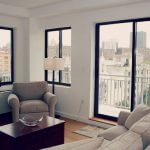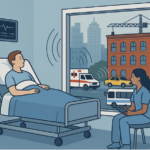Noisy Construction a Headache for Upper East Side Residents
If you live in New York or any other big city, you know all about construction noise. In fact, this nuisance can plague you no matter where you live. From your neighbor building a gazebo in the suburbs to a large-scale project in your urban neighborhood, noise pollution is everywhere.
Your windows leak the noise from the outdoors into your home. Your peaceful sanctuary is filled with the relentless intrusion of other people’s projects. Construction noise can be so loud that it’s harmful to your hearing.
In one Upper East Side neighborhood in New York City, the noise has gotten so bad that the residents are struggling to cope with the disruption. The culprit is the transformation of a parking garage into an eight-story self-storage facility.
At issue is the excavation, a process that involves jackhammering. Sometimes the noise goes on for ten relentless hours a day. One neighbor reported that she measured the noise in her apartment at over 97 decibels.
How Loud is Too Loud?
To give you an idea of how loud that is, a blender clocks in at about 88 decibels. A train whistle at 500 feet? That’s about 90 decibels. The 97-decibel level experienced in the NYC apartment is about the same as riding a motorcycle.
The CDC tells us that being exposed to noise over 70 decibels can cause damage to our hearing over prolonged periods. The louder the noise, the less time it takes for hearing damage to occur.
Without some form of protection, riding that 97-decibel motorcycle can begin to damage your hearing in 50 minutes. Some of these NYC residents have that level of noise entering their living spaces for ten hours a day, five days a week.
Noise has a cumulative effect on your hearing. Even noise at a much lower level than 97 decibels can damage hearing if it goes on long enough. The World Health Organization and the Environmental Protection Agency agree that noise exposure should remain below 75 decibels over 8 hours.
When increased to 24 hours, the noise should remain below 70 decibels to prevent noise-induced hearing loss. When the delicate structures in our inner ear are bombarded with loud noises, they can be permanently damaged. As much as 20-25% of the U.S. adult population has some level of noise-induced hearing loss.
As noise exposure continues, hearing loss worsens.
Reducing Construction Noise
Not everyone will experience the same level of indoor noise in this type of situation. The home experiencing 97 decibels is right across the street from the project. Homes further away would see a slightly lower level.
The configuration of the homes also matters. Good insulation and soundproof windows can also significantly reduce the level of noise entering a resident’s living space. CitiQuiet’s soundproof window inserts eliminate up to 95% of existing noise.
In the case of our beleaguered Upper East Side New Yorkers, after several months of complaints, the city issued a summons for the intrusive noise from the jackhammers. However, the hearing isn’t until May (by which time the hammering will hopefully be finished) and the penalty is only a $560 fine.
The company installed some soundproofing blankets around the site, brought in some third-party noise control management, and offered the 97-decibel resident protective earmuffs.
In the eyes of the residents, there isn’t much incentive for the company to do a lot about the noise. At least one resident who works from home is considering moving. So far, the neighborhood is unsatisfied with the actions being taken.
Coping with Construction Noise
It certainly appears that, for the most part, the residents of this neighborhood are on their own trying to deal with the long hours of daily jackhammering. They need to figure out how to make their homes livable.
The only fortunate part of this situation is that the construction is all happening during the day. Nighttime noise disrupts sleep. Poor sleep has health impacts and can lead to reduced daytime productivity.
But what of those who are at home all day, with noise as loud as 97 decibels making their homes miserable? They need to do something to be comfortable and protect their hearing.
The best way to prevent noise-induced hearing loss is to get away from the noise. While it’s easy to walk away from a noisy crowd, if you live near a construction site you have fewer options.
But you do still have options. Protective headgear is a good first step. Earplugs or protective earmuffs do work as long as they fit well and have a high enough noise reduction rating. The noise reduction rating indicates the maximum decibel reduction of the device.
You can also soundproof your windows. Not every bit of the sound entering the houses in NYC is coming through the windows, but windows are often a weak spot for noise control in a building or home.
Older buildings are particularly prone to broken seals and other noise-leaking window issues, but any home can be quieter with soundproof windows.
Why CitiQuiet?
CitiQuiet’s soundproof windows can reduce existing noise by as much as 95%. Unlike other soundproofing systems, our windows can be installed quickly and without altering your current windows. They are completely operational, working with your windows, and can be removed.
In the case of the Upper East Side construction sufferers, that means a quieter home that still has fully functioning windows. The construction will end, and CitiQuiet allows windows to be opened when these residents are ready to let in some fresh air.
CitiQuiet window systems were developed in New York City. The first ones were installed right on the Upper East Side back in 1992. They are designed specifically to deal with city noise, be useful for both homeowners and renters, and be an affordable improvement to your home.
CitiQuiet soundproof windows can prepare you for the next construction project in your neighborhood. Keep your home livable as your neighborhood grows and changes with CitiQuiet soundproof windows!



